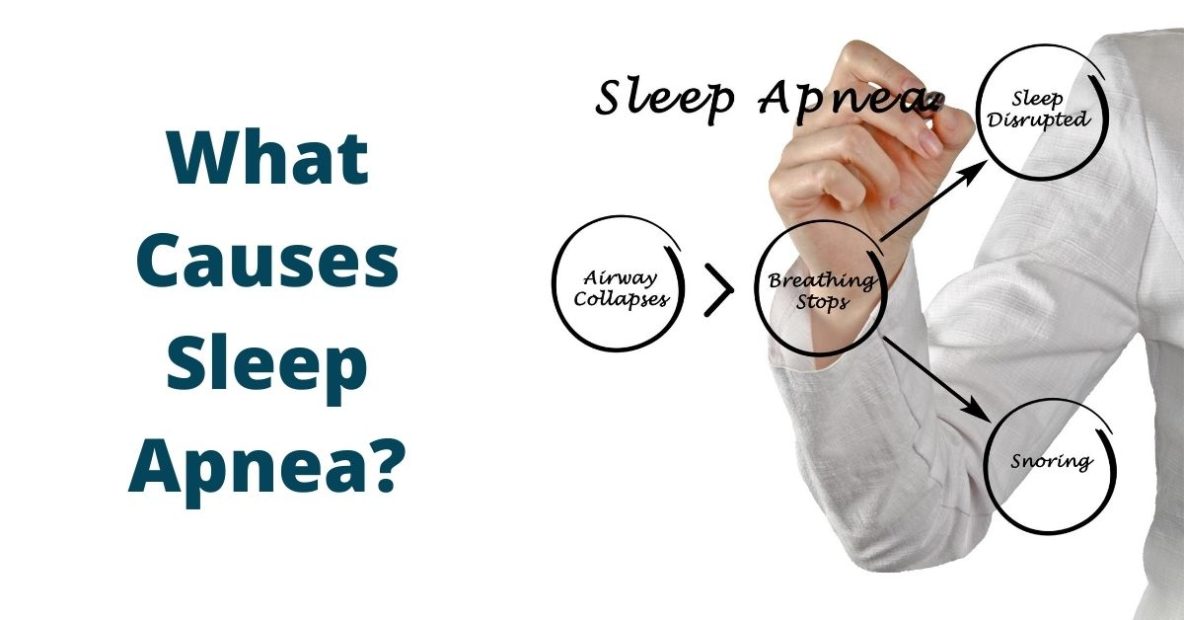What Causes Sleep Apnea?

- A Promising Paradigm Shift: New Research Challenges the CPAP-First Approach to OSA Treatment - September 5, 2023
- Understanding Sleep Meditation Techniques - July 30, 2021
- How Online Learning Has Affected Sleep for Students - July 13, 2021
Sleep apnea affects millions of Americans who have trouble sleeping, daytime drowsiness, and fatigue. It’s a serious condition that makes it hard to breathe during the night and can even block the air moving in and out of your lungs. Sleep apnea causes poor sleep as well as a number of other negative health outcomes. Here’s everything you need to know about the types of sleep apnea and what causes it.
Three Types of Sleep Apnea
There are three types of sleep apnea that can affect your breathing during the night.
- Obstructive sleep apnea: The most common type of sleep apnea is obstructive sleep apnea. In this condition the muscles in the back of the throat relax, closing the airway and physically blocking your lungs.
- Central sleep apnea: Central sleep apnea is less common, and it originates in the brain. During sleep, the brain fails to regulate the muscles you use to breathe. This will lead to shallow or slow breathing, or even pauses in breathing.
- Mixed sleep apnea: Sometimes a person can have both obstructive sleep apnea and central sleep apnea. This mixed sleep apnea has the same symptoms of shallow or slow breathing, as well as a physical block of the airway.
Recognizing the Symptoms of Sleep Apnea
Whether you have obstructive sleep apnea, central sleep apnea or mixed sleep apnea, you will experience some of these symptoms:
- Loud snoring during the night
- A choking feeling during sleep
- A pause in breathing during sleep, followed by a gasp
- Labored breathing during sleep
- Dry mouth in the morning
- Morning headaches
- Daytime fatigue
- Difficulty concentrating or thinking
- Irritability
You may not notice all these symptoms because you sleep through all the sleep disturbances. Ask your partner if they’ve noticed any snoring, choking, or gasping sounds, or if they’ve noticed that you sometimes stop breathing during the night.
What Causes Obstructive Sleep Apnea?
Obstructive sleep apnea is caused by a physical blockage of your airways. During sleep, your tongue, throat, and neck muscles may relax, causing the muscles to narrow or completely block your airway! Your breathing can stop for up to several seconds. Then your brain will send a signal to briefly wake up your body, tightening the muscles and restarting the flow of air.
You may only be awake for a few moments, and you won’t remember being awake. This can happen more than 30 times in one hour. Your sleep will be completely disrupted, and even if you don’t remember waking up in the night, you won’t have had a deep and restful sleep
What Causes Central Sleep Apnea?
Central sleep apnea has a very different cause than obstructive sleep apnea. In central sleep apnea, it’s the brain rather than the muscles that causes breathing problems. During sleep, your brain continues to regulate the muscles that keep you breathing. Sometimes sleep can disrupt this automatic process, causing you to breath shallower and slower than you should be.
Central sleep apnea can also be caused when the brain doesn’t sense how much carbon dioxide is in the body. When this happens, breathing becomes even shallower and slower than it should be, and your body won’t receive enough oxygen.
Central sleep apnea is usually linked to another health condition, such as a stroke, an illness or infection, an injury that damaged the brain, or even a brain tumor. Some pain medications can also cause central sleep apnea.
Risk Factors for Sleep Apnea
Certain behaviors or conditions can increase your risk of developing obstructive sleep apnea. Some of the most common risk factors for sleep apnea include:
- Physical features such as a narrow airway, or enlarged tonsils that can block the airway
- Chronic nasal congestion at night
- Asthma or other breathing problems
- Smoking
- Obesity that lead to fat deposits around the upper airway and restricting airflow
- Diabetes
- High blood pressure
- Sleeping on your back
These are just some of the risk factors for sleep apnea. If you want to learn more about the types of sleep apnea and the causes of sleep apnea, visit us at Sound Sleep Medical. Find out if you have sleep apnea by taking a sleep test, and explore your treatment options so you can get the sleep you need.
